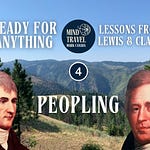Jupiter and I have been hard at work for you. Over the past few weeks, we have shot video for, count 'em, five Moving Experiences, our new virtual tours. Look for the first one, a walking tour of the Appian Way, next month.
While on my way back to the States, I passed through England, and my thoughts turned to King Alfred, since I was planning a day trip to Winchester, the seat of his kingdom back in the ninth century. I wrote part of this week's column while sitting on a park bench next to a lovely stream that runs through the town.
I think you will enjoy getting to know King Alfred (if you don't already). Maybe you will even make a trip to Winchester yourself. I highly recommend it.
Finally, I want to thank my medievalist friend, Roger Ladd, for reading a draft of this essay and offering some valuable feedback. Roger is the real deal. His middle name is Alfred, and he has actually baked bannock bread!
Does the name "King Alfred" mean anything to you? If it does, then you probably grew up in England (or maybe, like my wife and me, binge-watched the Netflix series The Last Kingdom).
For the rest of you, including my fellow Americans, I should explain that King Alfred was the heroic king of Wessex (in the southern part of the British Isles), remembered for his military success over the Danes. Although Queen Elizabeth I would probably top the list of greatest English monarchs, Alfred has a viable claim to being the greatest English king (even if he did not rule all of England). He was, after all, known as "Alfred the Great."
King and Scholar
As an American who was ignorant of Medieval English history, I did not become aware of King Alfred until I was in graduate school, where I took a class in Old English. Like a handful of other political leaders, such as Thomas Jefferson and Theodore Roosevelt, Alfred, it turns out, was a serious scholar, as well as an advocate for learning. He translated works by Boethius, St. Augustine, and Pope Gregory from Latin into English (and/or commissioned others to translate them) and, in a letter to bishops in his kingdom, laid out an education plan, which included reading instruction for the sons of freedmen. It was during his reign, furthermore, that the English began compiling the Anglo-Saxon Chronicle, a major source of historical information about medieval England. At least partly because of the impressive burst of scholarship under Alfred, in fact, the dialect spoken in his region of Wessex, called West Saxon by modern scholars, is recognized as the literary dialect of the age.
In short, whatever he did politically, Alfred certainly was "Great" in the estimation of us literary scholars.
What he did politically, though, was certainly significant, as well. For one thing, he took on the Danes (Vikings) when they were threatening to conquer large parts of English territory, defeating them at the Battle of Edington in 878 and later wresting London from their control. It’s an impressive record for a sickly man (perhaps inflicted with Crohn’s Disease) who wasn’t even supposed to be king. (He assumed the throne after his older brother Aethelred died in 871.) Is it any wonder the English remember him so fondly?
. . . But Not a Serious Contender for the Great British Bake Off
Now, as you can see, Alfred had a lot on his mind. You don't become the Great by frittering away your time.
If a famous anecdote about him is true, he also was a mensch (long before that Yiddish word made its way into English).
The story goes that the king, traveling alone in a remote region near Athelney in the salt marshes, came upon a swineherd's cottage and wound up spending a few days there. With no access to Netflix, the swineherd's wife didn't have the benefit of having watched The Last Kingdom, so she didn't recognize this stranger in her house as the king. Now, like countless homemakers over the millennia, this woman had too much to do and not enough time to do it, apparently, and she left some "cakes" (actually loaves of bannock bread) baking, only to smell them burning a moment later. "Look here, man," she reportedly said to Alfred, "You hesitate to turn the loaves which you see to be burning, Yet you're quite happy to eat them when they come warm from the oven!" Poor Alfred, scenes from "The Little Red Hen" surely running through his addled mind, took the abuse and got to work tending the loaves.
Ah, Alfred, you had one job. Actually, let's be fair. He did have one job – being king – and he did it well enough to get "the Great" tacked onto his name, more than most of us can claim. Still, he blew it this time, and he knew it.
A Response Fit for a King
In this version of the story – the first known version, as recorded in something called The Life of St. Neot – and in every other version I have located, Alfred never reveals his identity. This is the master stroke of the story because of what it says about Alfred. He's humble, respectful. He could have wielded his power to have her locked up, I would think, or, at the very least, humbled her by saying, with appropriate bluster, "Do you know who I am?" (as we can easily imagine a modern celebrity doing when, say, she doesn't get the best table in the restaurant). Instead, he took his lumps and focused on those cakes.
By the way, let's give his Grace a little grace. He may not have had an oven or even a pan. Food historian Neil Buttery explains:
Cast iron equipment such as griddles or waffle irons, were expensive, so many had to bake little cakes of ground cereal grain (wheat, rye or oats) directly into the embers of their fires.
Baking these cakes required both an eagle eye and excellent judgement – the outside needed to be just scorched, and the inside fluffy and warm.
I've never tried to bake bread this way – or, for that matter, any other way – and I'm thinking Alfred should be forgiven, especially since, remember, he had a lot on his mind, what with his kingdom under attack and all. (Alfred, I'm with you, brother. My wife knows better than to leave me alone in a kitchen, especially when I have something else on my mind, and I always have something else on my mind.)
The Alfred They Want
Whether the king reacted humbly when this woman tore into him or whether the incident ever happened at all is, on one level, unimportant. Regardless of historical fact, the story says a lot about the British, who have known and retold it for centuries. This is the Alfred they want to know, just as Americans want to think of their beloved George Washington as someone who, as a child, had to tell the truth about cutting down the cherry tree. (Brace yourself: Parson Weems, an early biographer of Washington, probably made this one up.)
That's the power of story. It can capture the values of an entire nation, serving to bind and inspire thousands or millions of people.
Now, if you'll excuse me, I think I have something else I'm supposed to be doing. I'm going to go check the oven.












Share this post